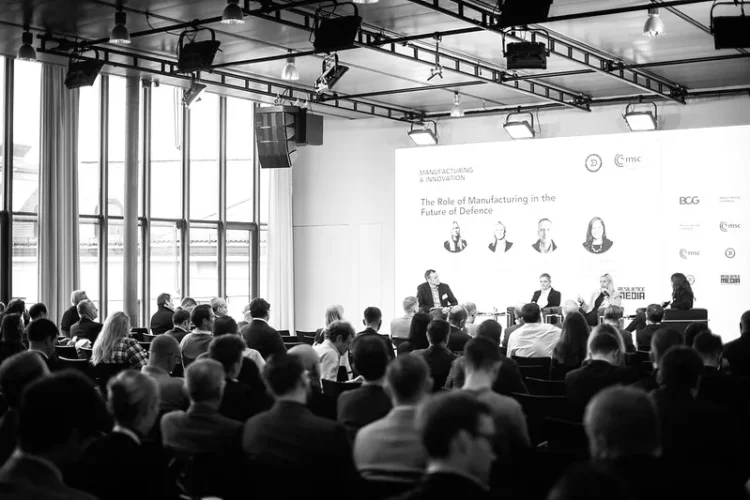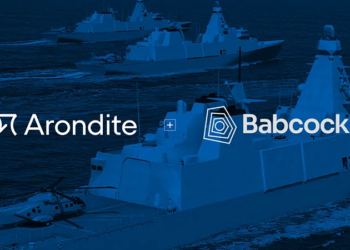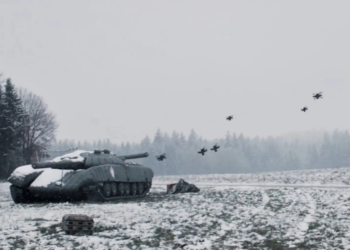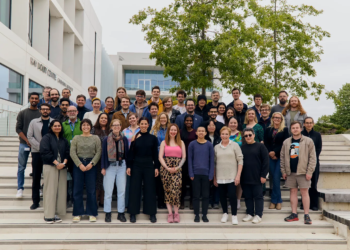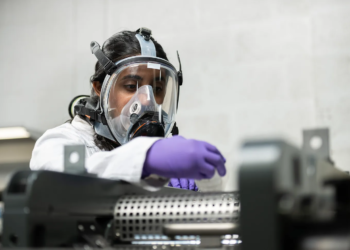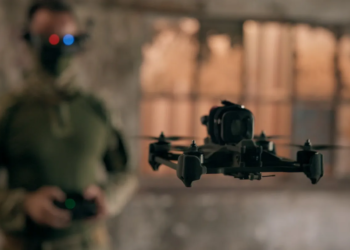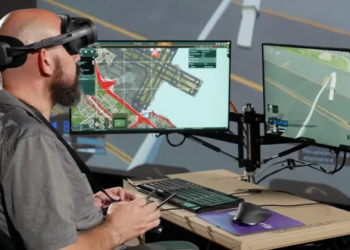We were in Munich last week to run an event with the U.S Defense Innovation Unit: The Future of Defence Tech Manufacturing & Innovation. The premise of the discussion was that if President Trump froze the war in Ukraine, we would enter a four-year arms race with Russia and will need to increase our defence manufacturing capacity, both to prepare for war and as a deterrent.
Little did we know when we planned this event that it would be so timely. History was unfolding outside the windows of our venue as we discussed how NATO countries and allies should be responding. It was an intense couple of days, much of it spent with members of the Ukrainian government and other highly informed Ukrainians, like Eveline Buchatskiy of D3 Ventures, so we experienced their reaction to events live, discussing the political speeches huddled around a cafe table in the heart of Munich.
At the event, a unique and diverse group of people took to our stage and spoke passionately about how critical this is, and about what they are doing to help. Designed to be a call to action, the message came through in every panel that we are at war, we are not prepared, and we need to build up our defence manufacturing capacity urgently.
Nataliia Kushnerska, CEO of BRAVE1, set the tone, pointing out that “the war in Ukraine shows us that we are not ready for war. All our manufacturing is scaled up only to refill the stocks.” Srdjan Kovacevic, CEO of Orqa, pointed out that procurement needs to move at the speed of technology, not the other way around.
We heard from Kevin Czinger about how his US tech company, Divergent Technologies, can 3D print missiles at a fraction of the cost and weight of existing processes, and far more quickly. He spoke of his wish to see his company, and his competitors, invited to deploy across Europe to help increase both its readiness for war, and its resilience. With 3D printing, factories can be producing car components in peace time and switch to weapons at the flick of a switch. This opportunity was echoed on the same panel by Oluseun Taiwo, CEO of Solideon, which creates autonomous, deployable factories.
Rob Murray, of Saab, again framed this reality, telling the audience, “I think we need to have a few hard truths said. And the first is that whether we like it or not, Europe is at war. And we need to recognise that. And it might not be the sort of war which perhaps all of us have historically seen. It’s certainly the sort of war Ukraine understands, but we are at war. And so as a result, we have to be very strategic and focused on how we resource that.”
In a panel about the New Economics of War, Rob went on to talk about the importance of establishing quickly a multilateral defence bank to significantly increase the funding available for defence, and in particular for CapEx-heavy areas like manufacturing.
This panel also looked at the trouble defence tech companies have opening bank accounts. Eveline Buchatskiy explained how Ukrainian drone companies sometimes have to start out as ‘agricultural drone companies delivering fertiliser to Russia’ in order to open bank accounts.
German arms manufacturer Rheinmetall announced a partnership with autonomous drone software insurgent Auterion, expanding the reach and effectiveness of both battle-hardened companies. On why they formed a partnership, Lorenz Meier spoke of Rheinmetall’s comfort with risk, a sentiment Klaus Kappen, CTO of Rheinmetall echoed: “We have to enforce our manufacturing base. We have to take risk, otherwise we are too slow. And were talking about contracts, okay, in the end everybody needs contracts. But sometimes you have to go the first step [without a contract in place]… we’re building lots of ammunition plants right now. And within 12 months from breaking ground … the first ammunition is coming out of the facility, [n]ot only in Germany, in other countries too. And therefore you have to take risk, you have to [have courage]. Otherwise we cannot support the security in Europe.”
We welcomed former Deputy Secretary General of NATO, Mircea Geoana, to the stage with Farah Stockman from the New York Times. He provided an interesting insight into the news unfolding outside, saying, “if [they] really want to engage in a hyper competition with China, America cannot do it without its allies. …I think America will find pretty soon that is much better to have so many allies, and in NATO you have 31 in one room. It is sometimes difficult to work with 31 allies to have consensus. But I think it’s a precious alliance. And I would really be very careful before saying that the time of this alliance is over.”
Karl Haeusgen, President of VDMA, the German Machinery and Equipment Manufacturers Association, added that, “no single American tank, no single American missile will be manufactured without German manufacturing equipment. Not a single one.”
During the Auterion and Rheinmetall fireside chat, the panelists were asked where we need to be in five years. Lorenz Meier of Auterion said simply, “[we need] a million drones that are ready to go at a moment’s notice and provide credible deterrence in Europe’s east.”
Kusti Salm, of Estonian missile startup Frankenburg Technologies, told the audience, “the fact that we’re still talking about this dual use need for investors…it just is kind of hilarious to me. A lot of these folks would be invested in the S&P 500 with [companies] like Lockheed on there…why are we worried about a company being dual use to invest in them? I think it’s crazy. We have to start looking at companies that are pure defense plays and making sure that we’re investing capital in them to supercharge them.”
The event had a real sense of urgency, as world events were unfolding quite literally outside the building. The announcements from Secretary of Defense Pete Hegseth and Vice President J.D. Vance sent palpable ripples through the city. It is clear now that Europe has to stand on its own and defend itself, and therefore everything we’ve been discussing about defence funding and innovation needs to happen now, not sometime in the future.
“We believe in a brighter future and we believe in contributing to that and not just being on the sidelines”
Reflecting the energy in the room, Eveline Buchatskiy explained to our audience, “I’m dressed all in black for a reason. I feel like I just came from a funeral. But it gets better, folks. Of course the announcements from yesterday are uninspiring to say the least, but we are ultimately…in this business because we are optimistic people. We believe in a brighter future and we believe in contributing to that and not just being on the sidelines.”
Over rounds of coffee the next day we discussed how the political events would affect the nascent defence tech ecosystem. Quite possibly we will see the Ukrainian market shift from hundreds of drone companies producing quickly for the battlefield to the best companies surviving, growing, exporting whilst many of the smaller ones fall away or are acquired. We may also see more of the expertise developed in Ukraine being exported out to its allies where it can be incorporated into the wider European and NATO defence industry.
There was a jarring sense that we had just been in Munich at a moment in which the global order changed abruptly. One person spoke of how sudden shocks often take time to sink in, and that people were only just digesting quite how significant this last 24 hours had been.
A positive take was that Trump had just forced actions in Europe over 48 hours that might otherwise have taken 48 months. There was no doubt amongst anyone we spoke to that Russia will simply see this as a pause in the war for them to re-arm, recover some of their economy, and prepare to attack Ukraine again in four years. As we have been saying over recent months, we are shifting from the urgency of a war today to the urgency of an arms race into the next phase of that war.
We talked about the occupied parts of Ukraine that Trump seemed content to hand over to Putin. This land is home to around six million people. Our Ukrainian friend told us about people she knew who had lost businesses, homes, property as the front line crept forward and absorbed them. As soon as your property falls under Russian occupation, it moves from Ukrainian law to Russian marshal law. You cease to own anything. And beyond the property, the people trapped under Russian occupation are are suffering torture, imprisonment, and are being forced to give up their national identity and become Russians. Street names are changed, school books replaced, the language is changed. Legally, erasing a cultural identity is genocide. Trump is trapping six million people, a population larger than that of Los Angeles, in a fascist military zone, our friend explained.
She went on to add that within that population, maybe around 1-2 million are men of fighting age. They will be given a choice in the future to fight with the Russians or be killed by the Russians. The boys there now will have years of brainwashing to prepare them to join Russia in another war. In future wars, we should expect to see Ukrainians fighting alongside Chechens, Syrians, and others that have been subsumed into Russia’s dictatorship.
Munich was exciting, depressing, and motivating. It was good to see VCs and startup founders mixing with the politicians and military leaders, though another official MSC innovation event aimed at defence attachés and politicians talked about things like Artificial Intelligence like they were new innovations on a distant horizon. There still remains a dangerous gulf between where technology is now, and where those who need to procure it are. We will continue to try to address that with events like this.
The Future of Defence Tech Manufacturing & Innovation, was presented by the US Defense Innovation Unit and Munich Security Conference Tech & Innovation Thursday, sponsored by Boston Consulting Group, and powered by Resilience Media.


